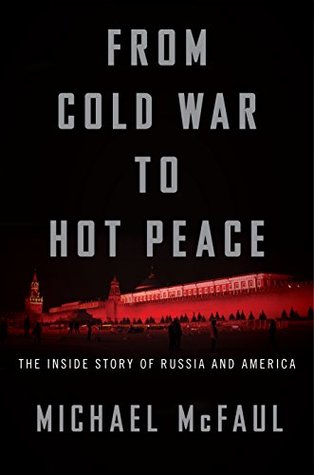More on this book
Community
Kindle Notes & Highlights
Read between
March 19 - June 4, 2022
His surveillance concerns were not in keeping with a country that grossly violated its citizens’ privacy rights. It would be like fighting for civil rights in the United States in the 1960s while living in exile in apartheid South Africa.
And what did I do wrong? Since an interest in the Soviet Union had first been kindled in me as a high school student in 1979, I had believed that greater engagement with Russians could bring our two countries closer together. In the 1990s I not only believed, but also actively participated, in helping Russians develop democratic institutions and closer relations with the West. I joined the Obama administration in large part to take another run at these grand objectives. Without question, I had failed to achieve them. Was I at fault for pursuing the wrong strategies for obtaining these
...more
I will take a crack at this, with the disclaimer that this is my layman's opinion and that my knowledge of Russian history--while more expansive than the average person--does not hold a candle to Ambassador McFaul's expertise.
McFaul's zeal for democracy inside of Russia most likely came from his interactions with the Russians who pushed for democracy inside the country, both while in the Soviet Union and as an independent federation. He saw the efforts of these liberal groups--particularly Yeltsin's ascension to power and in Dmitry Medvedev's incremental liberalization of Russia during his tenure as President.
The reality, as I perceive it, is that while there have been plenty of activists within Russia at any given time in its history, invariably one of two things seems to happen:
-the movement dies out, or
-the activists take control and slowly seem themselves become the authoritarians.
Or as the old movie quote goes, "You either die the hero or live long enough to see yourself become the villain."
When you look at Russian history, there aren't many periods, if any, where democracy flourished within the country. They've been ruled by strongmen throughout the history, whether it's the tsars, the Bolsheviks, or the siloviki. When a people have been so thoroughly subjugated across the course of centuries in one fashion or another, you cannot cure that overnight.
This is especially true when a command economy is present. Part of why democracy failed under Yeltsin was that the Soviet bureaucrats who ran the state oil companies simply transferred those assets to private companies they owned and became billionaires overnight (the oligarchs). While they lived the high life, the people suffered extreme poverty, and that opened the door wide for associating "democracy" and "capitalism" with hardships, as well as for a return to the "good old days" of authoritarianism. Putin capitalized upon that.
So, while I admire McFaul's dedication to democratic ideals and the idea that such ideals could be instilled in Russia, where I would say he went wrong was taking his interactions with Russian liberal activists over the years as indicative of the national attitudes as a whole.
The average Russian, much like the average person anywhere, really only cares about stability and prosperity within their own lives. In Russia's case, they had more stability under an oppressive Communist government than they did under the no-holds-barred capitalism that rapidly led to oligarchy.
It presents an uphill battle: to introduce greater stability and prosperity, a democratic form of government should be installed, but in order to do that, once has to break a cycle of ineffective protest at best or corruption of the activists-turned-rulers at worst.
I'd also argue that democracy should be introduced to such a people in increments, with oversight. It's going to take a couple of generations for the people to get acclimated to democratic ideals, and the incremental speed helps ensure that nefarious actors don't capitalize for their own gain at the expense of the people. That said, the downside is that people with power are reluctant to relinquish it, which is why international oversight would be absolutely critical for such an approach.


